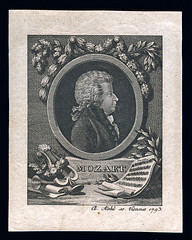Mozart Clarinet Quintet in A major, K. 581 (1789)
 |
| Academy Of St. Martin-In-The-Fields via last.fm |
10:00 - Larghetto
17:30 - Menuetto
25:10 - Allegretto con variazioni
Performed by members of the Academy of St. Martin-in-the-Fields Chamber Ensemble (1980).
Clarinet - Antony Pay
Violin I - Iona Brown
Violin II - Malcolm Latchem
Viola - Stephen Shingles
Violoncello - Denis Vigay
"[The] Quintet for clarinet and string quartet of the last Vienna period, the so-called Stadler Quintet, K. 581, [dates] from the end of September 1789. Mozart himself called it (8 April 1790) 'Stadler's Quintet.' Here is a chamber-music work of the finest kind, even though the clarinet predominates as 'primus inter pares' and is treated as if Mozart were the first to discover its charm, its 'soft, sweet breath,' its clear depth, its agility. There is no dualism here between solo and accompaniment, only fraternal rivalry. The term 'fraternal' is used advisedly— clarinets and basset horns acquired for Mozart a Masonic character, if perhaps only for external reasons: it seems that at the less solemn meetings of his lodge, only wind instruments were used. The development section has a concertante air about it, but for all five participants. The cantabile character of the second theme is resumed in the Larghetto and nursed into full flower. The Minuet contains one Trio in minor for the string quartet alone, and another, a Ländler, in which the clarinet becomes the rustic instrument that it was and has remained in South Bavaria and in the other Alpine provinces. The Finale is an Allegretto with variations; brief and amusing with all its variety and richness, serious and lovable. Mozart had originally begun a finale (K. Anh. 88) that anticipates almost note for note Ferrando's aria in Così fan tutte (No. 24) to the text 'Ah, lo veggio, quell'anima bella al mio pianto resister non sà'—the acme of joyfulness. But this 89-measure beginning turned out to be too concertante and may have seemed over-cheerful to Mozart. At any rate he discarded it. A quintet-fragment in F major for clarinet, basset horn, and string trio (K. Anh. 90) was perhaps another and even more elaborated study for the Stadler Quintet; but it would necessarily have turned out still more concertante in style." - Alfred Einstein











